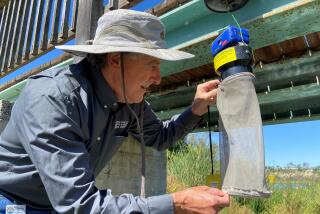2nd Annual Seminar : Dentist Could Be First to Spot Signs of AIDS
- Share via
A dozen dentists and dental hygienists leaned forward to study a color slide of a man with black lesions in his mouth.
The man had Kaposi’s sarcoma, a symptom of AIDS, explained Leslie Aspis, director of dental health programs at UCI Medical Center in Orange.
These days, she said, a dentist could be the first health professional to notice such symptoms, order blood tests and diagnose the fatal disease.
Theme of Compassion
But before sending patients out for blood tests, Aspis asked dentists to understand the emotional impact of an AIDS diagnosis. “Instead of making this an epidemic of fear,” she urged, “turn it into one of compassion.”
The need for compassion was a recurrent theme Tuesday as 400 doctors, nurses, paramedics and other health professionals gathered at the Anaheim Hilton and Towers for the Orange County Health Care Agency’s second annual seminar on AIDS.
Orange County, with 923 AIDS cases reported from 1981 through 1988, has the fourth largest AIDS caseload of any county in California, said Dr. L. Rex Ehling, the county’s public health director.
Though AIDS is still considered “a major epidemic,” its growth here appears to be slowing, county epidemiologist Thomas J. Prendergast said.
“It’s not affecting new subgroups. . . . We’re not seeing evidence of new routes of transmission,” Prendergast said. The county’s AIDS cases had once doubled from year to year. But there was only an 18% increase from 1987 to 1988, he said.
Prendergast predicted that if cases of acquired immune deficiency syndrome here do not level off by 1990, “they will level off the year following that.”
Meanwhile, health workers are still grappling with AIDS-related issues. Dr. Steven Kleinman, medical director for the American Red Cross in Los Angeles and Orange counties, noted that there is a small risk--1 in 68,000--of contracting the AIDS virus from donated blood.
Also, while health workers can be exposed to the virus from accidental needle punctures, they are at greater risk of exposure to hepatitis, said Dr. Lauri Thrupp, chief of infection control at UCI Medical Center.
More to Read
Sign up for Essential California
The most important California stories and recommendations in your inbox every morning.
You may occasionally receive promotional content from the Los Angeles Times.









